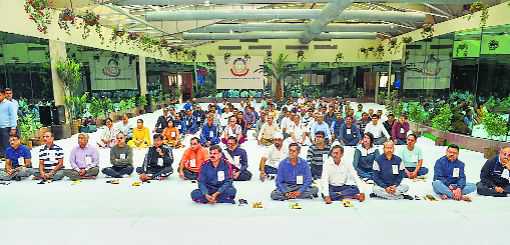
Art of coexisting: Differences of opinion within the CBI could have been handled more adroitly and tactfully.
Sankar Sen
former Director, National Police Academy, Hyderabad
THE ongoing developments in the Central Bureau of Investigation (CBI) are unfortunate and deplorable. Its Director and the Additional Director are locked in a bitter feud which has virtually split the organisation. The apex court has now intervened and is inquiring into the unsavoury charges and counter-charges. This, indeed, is perhaps the darkest hour of the organisation.
However, there are strong reasons to hope that the CBI will be able to weather the storm and regain its lost honour because at different levels, it has a large number of officers of probity and professional competence, who have done outstanding investigation in many difficult and complicated cases such as the Rajiv Gandhi murder case and Bombay bomb blast case. In many controversial and sensational cases occurring in different parts of the country, there is public demand to entrust the investigation to the CBI. It has not forfeited public trust.
During the initial years after being set up in 1946, the CBI had able and upright Directors like DP Kohli and F Arul. It selected officers carefully and brooked no interference in its work. For IPS officers, deputation to the CBI was a prestigious assignment, as they could function free from the pulls and pressures of state politicians.
Deterioration during Emergency
The CBI’s decline and politicisation started during the Emergency. Over the years, successive governments at the Centre, through pulls and pressures, tried to ensure that the CBI, in politically sensitive cases, toes the line desired by the government. In the words of the eminent jurist, Fali S Nariman, the CBI has been functioning ‘not by notes on the files but on nods and winks of the ministers, or senior officers in-charge of administrative ministries’.
In the coal block allocation case, the Supreme Court had to rap the CBI for showing the status report to the Law Minister and Coal Ministry officials for making deletions and additions, which virtually changed the heart of the status report, and subverted the integrity of the investigation. It dubbed CBI a ‘caged parrot’ which has to be liberated.
Unfortunately, that goal has remained unrealised. Section 4 of the Delhi Police Establishment Act provides that the CBI will function under the ‘superintendency’ of the Central government. In the case of Vineet Narain (better known as Hawala case), the apex court observed that Section 4 of the Act cannot prevent actual supervision of an offence by the CBI, and the Central government is precluded from issuing any direction to curtail its jurisdiction to investigate into the offences.
Partial and shared control
In the Hawala case, the apex court adopted the doctrine of ‘continuing mandamus’ that allowed it to issue interim orders from time to time. The apex court gave the power of superintendence over the CBI to the Central Vigilance Commissioner (CVC), but it was only with regard to cases registered under the Prevention of Corruption Act. Thus, the control of the CVC over the CBI is partial and shared. Recording of the ACRs is with the government, and the superintendence of the CBI in all other cases is with the government.
The CBI chief is now appointed on the recommendation of a committee comprising the PM, Leader of the Opposition in the Lok Sabha and the Chief Justice of India. The present CBI chief, Alok Verma, appointed by this procedure, has contended that he can be shifted only by the select committee and not by the CVC. The issue awaits Supreme Court’s decision. But what the CBI is now witnessing is an open and no-holds-barred wrangle between the two seniormost officers. This is shocking and disgraceful. Both Verma and Asthana did not conduct themselves with propriety and grace. Promotion of Asthana as Additional Director, overriding the objections of the Director by the CVC, was a wrong step and created rival factions in the bureau — a recipe for mismanagement of sensitive cases now being handled by it. Similarly, raiding the office of a DSP of the organisation, and arresting him in his office, was unwarranted and avoidable. Things could have been done more tactfully and adroitly.
CBI does not have a law
The CVC seems to have acted in a manner desired by the government and now his inquiry against Verma will be supervised by a former Supreme Court judge. It is hoped that judicial intervention will help set things right in the CBI. But a few important corrective measures are immediately called for. A powerful body like the CBI must have an Act laying down comprehensively its duties and functions. It is missing at present. The Second Administrative Reforms Commission strongly recommended a new Act to govern the working of the CBI. The law enacted by Parliament should seek to insulate it from extraneous pressures, and make it apolitical and independent.
Constitutional status for chief?
For this, there are models in other countries which can be suitably adopted. There have been suggestions that the CBI Director should be given an independent constitutional status, like the CAG, and his report should be laid before Parliament. Another alternative is keeping the CBI under parliamentary control. In the interest of good and clean governance, the credibility of the CBI has to be restored, and it has to be reinvigorated to make it an effective instrument for fighting the monster of corruption.
Revive in-house cadre
It is possible to build up a powerful and effective anti-corruption agency if there is strong political will. A few in-house reforms are also necessary. At present, CBI officers are mainly police officers on deputation from the states. The bureau has to widen its horizon, and in order to be effective, it should have its own cadre of well-trained and competent officers. Recruitment of CBI officers in the rank of DSPs has been stopped for some time. This may be restarted. In the CBI cadre, there should be officers on deputation not only from the police, but also from departments like Customs, Income Tax, and other services. It is hoped that the Supreme Court’s directions will help the resurrection of the CBI.



























